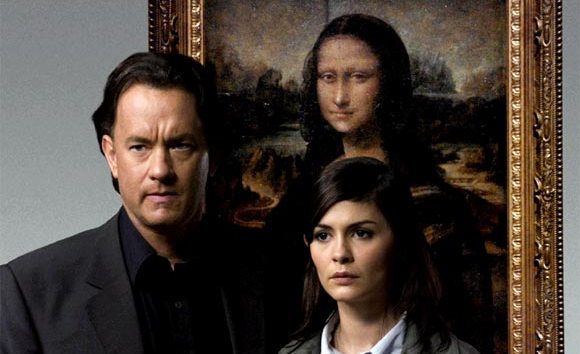
So, I was one of the minority of people out there who had not already read Dan Brown’s The Da Vinci Code when I ventured into the theater last week for a look-see at the film version (although various people had filled me in on most of the major plot points over the years.) This was partly because I had been told a few times that the novel read like a piece of cinema anyway, so I figured that, contrary to my usual m.o., I’d just wait for the movie. Well, unfortunately, Ron Howard’s film plays at best like a book-on-tape, one that might’ve made for a good airplane listen if the people involved hadn’t taken this enterprise so seriously. As it is, unless you relish usually likable actors spouting forth clunky, Akiva Goldman-penned chunks of exposition at you for two and half hours, leave this Code undeciphered.
Like I said, I’m really late to this party, so you probably don’t need me to summarize the basic gist here. In any case, world-renowned symbologist Robert Langdon (Tom Hanks), a Harvard professor prone to monologuing and/or gasping in awe when confronted with ancient relics (thank goodness, or otherwise he’d have nothing to do here) is thrust into a murder mystery after a colleague is found dead at the Louvre, his body bloodied by his own hand and laid out like Leonardo da Vinci’s Vitruvian Man. (As we saw in one of the movie’s creepier scenes (also in the trailer), this fellow was killed — under the watchful eyes of countless mournful Madonnas — by the albino monk Silas, an operative of Opus Dei with some serious body issues.) Soon, with the aid of the dead man’s painterly granddaughter, Sophie (Audrey Tautou), Langdon embarks on a quest to uncover the meaning behind the man’s murder, and, while puzzling and ciphering away, inadvertently stumbles onto a two-thousand-year-old conspiracy involving the divinity of Jesus and the Holy Grail, one that certain conspiring cardinals (Alfred Molina) and their pet monks will kill to keep under wraps…
That’s the upshot, and, as you can see, this has all the makings for a decent potboiler. And, at times, watching Hanks and Tautou puzzle away or seeing the film flashback to the Cecil B. DeMille days, one gets the sense that the Da Vinci Code is probably a thoroughly enjoyable beach book. But, as a film — or at least as this ponderous, too weighty-by-half film — it’s a total non-starter. Howard, Hanks, and Tautou can’t seem to stop treating this movie as an epic, when what it really needed was a slapdash of Raiders of the Lost Ark tongue-in-cheek. (In fact, I thought Nicolas Cage’s campy Da Vinci knock-off National Treasure came closer to the unapologetic B-movie tone needed here.) On the bright side, Ian McKellen (as a wry Grail historian, gleefully chewing his way through yet another bad summer movie), Molina (himself an Ark alumnus), and — briefly — Jurgen Prochnow (as a shifty Swiss banker) seem to have a better sense of the proceedings here, and they add some much-needed levity and narrative kick whenever they’re onscreen. Still, their best efforts aren’t enough to recommend Da Vinci, a film that needed less clumsy exposition and a jauntier sense of fun throughout. As it is, The Da Vinci Code is a rather staid canvas.
